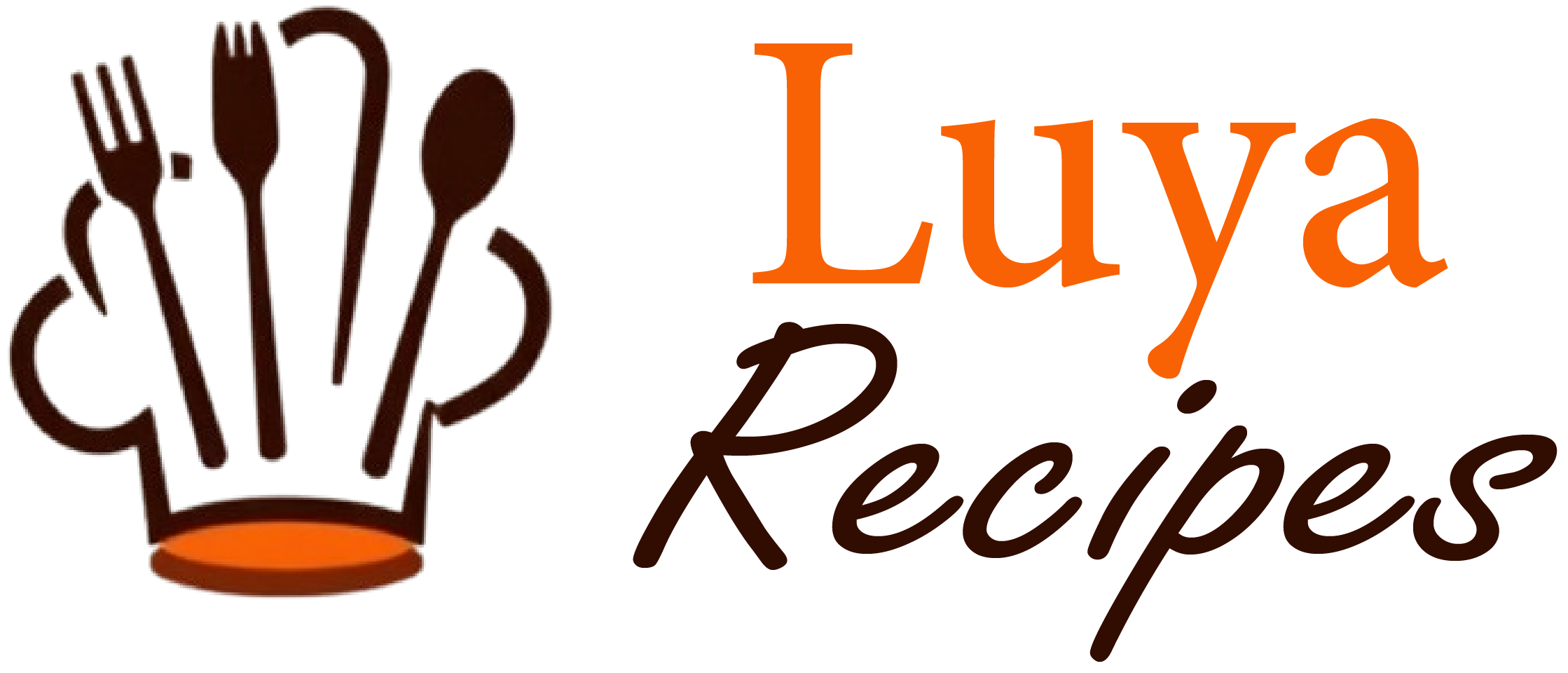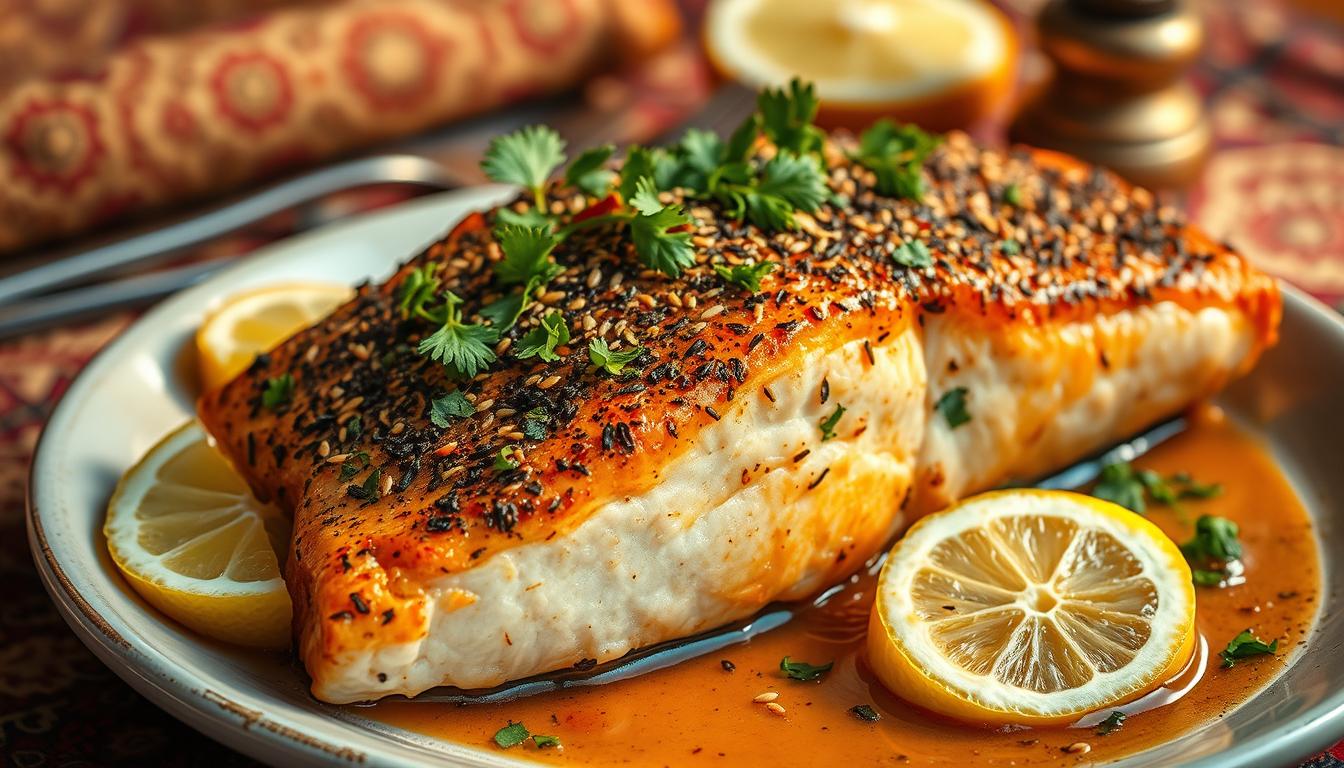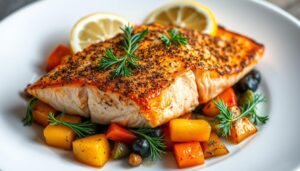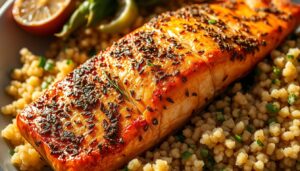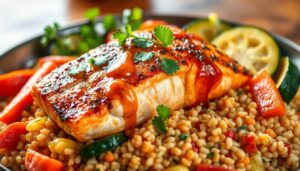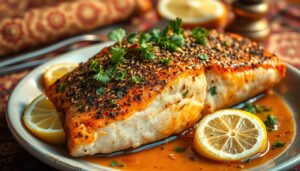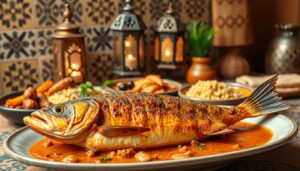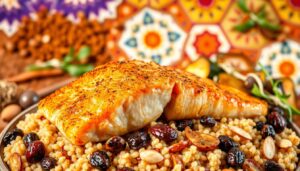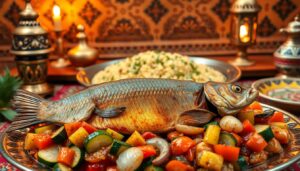Every culinary journey starts with a single bite that takes you across continents. For me, that magical moment was my first taste of a traditional Moroccan salmon recipe. It was like a flavor explosion in my mouth.
Moroccan cuisine is a vibrant mix of Mediterranean, Arabic, and Berber traditions. When you make a kosher Moroccan salmon recipe, you’re not just cooking. You’re creating a sensory adventure that connects cultures through amazing taste.
Imagine bringing the warmth of North African kitchens to your dining table. This traditional Moroccan salmon recipe will change your cooking. It offers a perfect mix of spices, techniques, and fresh ingredients, making every dinner a celebration.
Table of Contents
What Makes Moroccan Salmon Unique?
Moroccan cuisine is a vibrant mix of flavors that turns simple ingredients into amazing dishes. It makes kosher salmon dishes stand out with its explosion of tastes.
The secret of Moroccan salmon recipes is its rich history. It draws from Berber, Arabic, and Mediterranean traditions. This creates a unique taste that’s different from other cooking styles.
Cultural Influences and Flavor Foundations
Moroccan cooking is known for its complex spice mix. It’s a story of cultural blending, where each spice has its own history:
- Spices traded along ancient routes
- Techniques passed through generations
- Ingredients reflecting geographic diversity
Signature Spices and Ingredients
The authentic Moroccan salmon flavor comes from its special spice mix. Key spices include:
- Cumin – earthy and warm
- Paprika – adds depth and color
- Harissa – brings fiery heat
- Preserved lemons – provides tangy brightness
Cooking Techniques for Authentic Flavor
Traditional Moroccan cooking focuses on slow preparation and building flavors. Whether grilling, baking, or pan-searing, the aim is to mix spices in a way that enhances the salmon’s natural taste.
Moroccan cuisine is not just about cooking—it’s about creating an experience that engages all your senses.
Health Benefits of Salmon
Exploring the world of healthy Moroccan salmon recipes opens up a world of nutritional benefits. Salmon is not just tasty; it’s a health powerhouse. It can greatly improve your diet and overall health.
Salmon is a nutritional superstar, offering many health benefits. It’s not just delicious; it’s essential for a healthy diet.
Rich Source of Omega-3 Fatty Acids
Our bodies need omega-3 fatty acids, and salmon has plenty. The American Heart Association suggests eating salmon 2-3 times a week for good health. The benefits include:
- Reducing inflammation in the body
- Supporting heart health
- Activating fat-burning genes in the liver
- Helping prevent fatty liver disease
Packed with Essential Nutrients
Salmon is full of important nutrients for your health. Wild-caught salmon is even more nutritious, offering:
- High-quality lean protein
- Vitamin D for mood regulation
- Selenium as a powerful antioxidant
- Minerals supporting muscle recovery
Promoting Heart Health and Wellness
Eating salmon is good for your heart. It has omega-3 fatty acids that help keep blood pressure healthy and reduce blood clots. Eating it once a week can greatly improve heart health.
Wild-caught Alaskan sockeye salmon represents the gold standard for nutritional value and minimal contaminants.
Choosing a healthy Moroccan salmon recipe is more than just cooking a meal. It’s an investment in your long-term health and well-being.
Essential Ingredients for Moroccan Salmon
To make a true Moroccan salmon marinade, you need to pick the right ingredients. These ingredients add lively flavors to your dish. Knowing the key parts of Moroccan cuisine is the first step.
Start by choosing the best salmon. Look for fish that’s fresh, high-quality, and has a bright color. Wild-caught salmon gives the best taste for your marinade.
Spice Selection: The Heart of Moroccan Flavor
Moroccan food loves bold spices. These spices turn simple dishes into amazing ones. Your spice mix should include:
- Cumin – earthy and warm
- Paprika – adds vibrant color and mild heat
- Ground coriander – provides subtle citrusy notes
- Cinnamon – brings unexpected depth
- Turmeric – offers golden hue and slight bitterness
Perfect Accompaniments
Pair your salmon with traditional sides to make the dish complete. Fluffy couscous and roasted veggies are great choices. They show off the best of Moroccan cooking.
“Spices are the soul of Moroccan cooking, transforming simple ingredients into culinary magic.” – Traditional Moroccan Chef
When cooking your salmon, use fresh, high-quality ingredients. Let the spices marinate for at least 30 minutes. This way, you get deep, rich flavors.
Cooking Methods for Moroccan Salmon
Discovering the perfect cooking technique can make your Moroccan salmon recipe stand out. Each method brings unique flavors and textures. This makes the dish truly special.
An easy Moroccan salmon recipe offers many cooking approaches. These capture the essence of North African cuisine. Let’s explore three fantastic methods to prepare this delectable fish.
Grilling for a Charred Flavor
Grilling salmon adds a smoky flavor to your traditional Moroccan salmon recipe. Follow these steps for the best results:
- Preheat grill to medium-high heat
- Brush salmon with olive oil
- Sprinkle 1 Tbsp cumin and 2 Tbsp sweet paprika
- Grill for 4-5 minutes per side
Baking with Aromatic Marinades
Baking allows the salmon to soak up rich Moroccan spices. An easy Moroccan salmon recipe can be achieved by:
- Preheat oven to 180°C
- Create a marinade with preserved lemon
- Cover salmon with foil
- Bake for 15 minutes
- Remove foil and bake additional 5-7 minutes
Pan-Seared Perfection
Pan-searing creates a crispy exterior while keeping the salmon tender inside. Key ingredients include:
- 1/4 cup olive oil
- 6 garlic cloves, finely sliced
- 1 tsp salt
- 1 tsp white pepper
Pro tip: Let your salmon rest 15 minutes to 1 hour after cooking. This enhances flavor absorption.
Flavor Profiles in Moroccan Cuisine
Moroccan cuisine is a journey of flavors. When making kosher fish like Moroccan salmon, getting the flavors right is key. It’s all about creating a taste experience that excites your taste buds.
Moroccan cooking turns simple ingredients into amazing dishes. A kosher Moroccan salmon recipe follows a few important flavor rules:
- Balancing sweet and savory notes
- Layering spices with remarkable precision
- Incorporating fresh ingredients
- Utilizing citrus to elevate taste
Balancing Sweet and Savory
Moroccan chefs are experts at mixing flavors. Your kosher fish recipes can do the same. Use honey, preserved lemons, and spices to create a flavor that surprises and pleases.
“Moroccan cuisine is a symphony of taste, where each ingredient plays a crucial musical note.” – Moroccan Culinary Experts
Uniting Spice with Freshness
Spices in Moroccan cooking add depth, not just heat. Cumin, paprika, and turmeric create layers of flavor. Fresh herbs like cilantro and parsley add brightness, keeping your Moroccan salmon lively and engaging.
The Impact of Citrus on Taste
Citrus is key in Moroccan dishes. Lemons and oranges add acidity and refreshment. A squeeze of lemon in your Moroccan salmon can make each bite unforgettable.
Step-by-Step Recipe for Moroccan Salmon
Make the best Moroccan salmon recipe in your kitchen with this simple guide. This healthy dish will take you to Marrakech’s lively streets with its bold flavors.
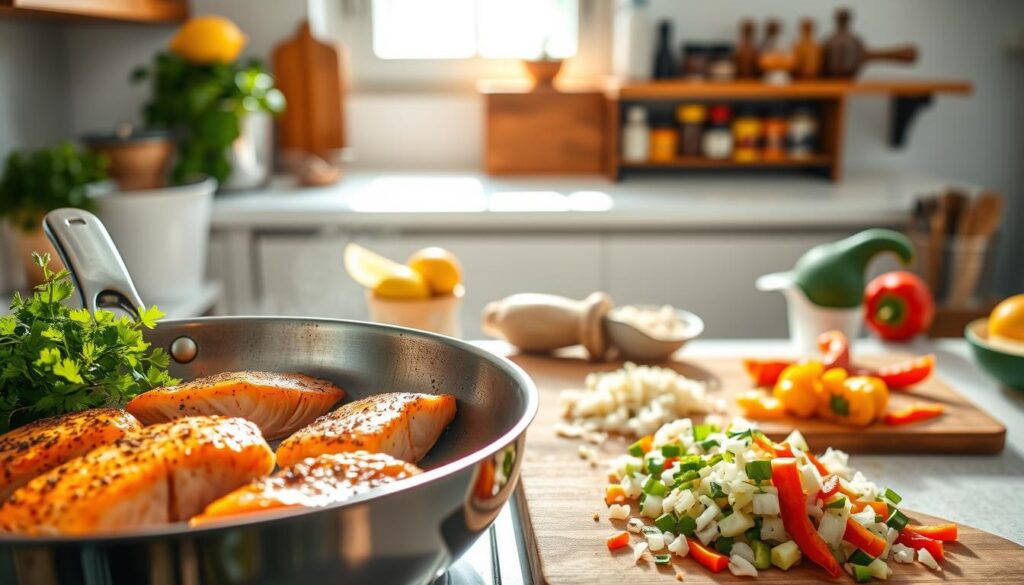
Making a real Moroccan salmon dish is easy. With the right ingredients and steps, you’ll make a tasty and healthy meal.
Ingredients You’ll Need
- 4 salmon fillets (6 oz each)
- 2 Tbsp extra virgin olive oil
- 2 tsp granulated sugar
- Spice blend:
- 1 tsp ground coriander
- 1 tsp ground cumin
- 1 tsp sweet paprika
- 1/2 tsp ground cinnamon
- 1/4 tsp Aleppo pepper
- Salt and black pepper to taste
- 3 Tbsp fresh cilantro
- 2 Tbsp fresh mint
Preparation and Marination
The marination is key for a great Moroccan salmon recipe. Mix your spices and coat the salmon well. Let it sit for 15-20 minutes to soak up the flavors.
Cooking Instructions
- Preheat your skillet with olive oil over medium-high heat
- Cook salmon for 6-8 minutes, reaching an internal temperature of 120°F
- Garnish with fresh herbs
Your Moroccan salmon recipe is ready to be enjoyed! Each serving has about 110 calories. It’s a great mix of protein and healthy fats.
Pro tip: Adjust the Aleppo pepper to control the spice level according to your preference.
Serving Suggestions for Moroccan Salmon
Creating the perfect kosher salmon dishes is more than just cooking. It’s about turning a simple meal into a feast for the senses. Serving your traditional Moroccan salmon recipe right can make all the difference.
Perfect Pairings: Sides and Salads
Your Moroccan salmon is best with the right sides. Here are some tasty options:
- Herbed couscous with fresh mint
- Roasted vegetable medley with cumin
- Moroccan carrot salad with cilantro
- Cucumber and tomato salad with lemon vinaigrette
Creative Ways to Present Your Dish
Presentation is key in Moroccan cuisine. Here are some ways to make your kosher salmon dishes stand out:
- Serve on a traditional tagine platter
- Garnish with fresh herbs and lemon wedges
- Use vibrant ceramic plates that reflect Moroccan colors
- Sprinkle toasted sesame seeds for added texture
Wine and Beverage Pairing Ideas
Choosing the right drink can elevate your traditional Moroccan salmon recipe. Here are some refreshing choices:
- Crisp white wines like Sauvignon Blanc
- Moroccan mint tea for an authentic touch
- Light-bodied rosé wines
- Sparkling water with fresh citrus
Storage and Leftovers for Moroccan Salmon
Keeping the flavors of your Moroccan salmon recipe fresh is key. Whether you enjoy kosher fish recipes or seafood, knowing how to store salmon is important. It helps keep the taste and nutrients great.
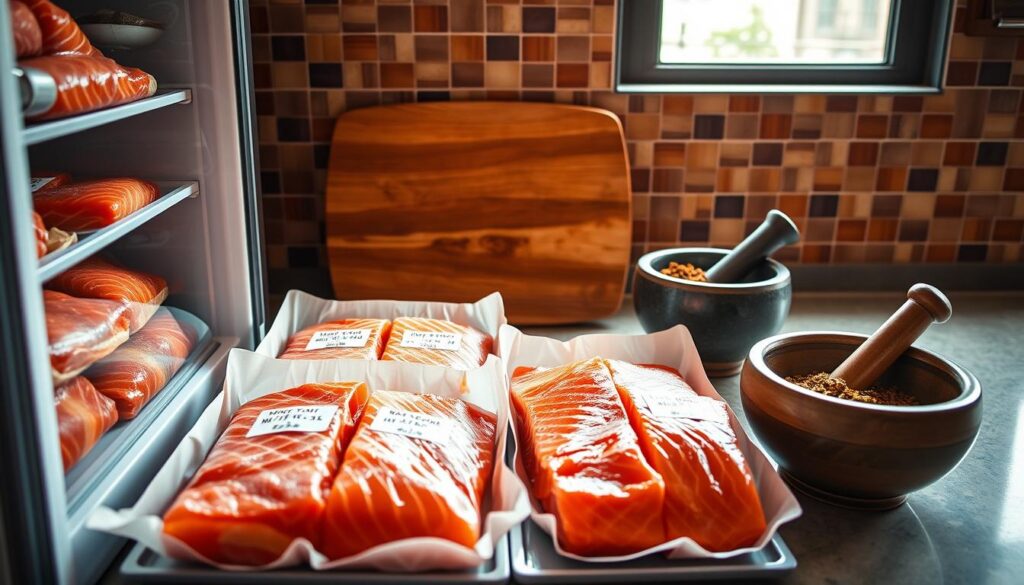
Best Practices for Freshness
Start with the right temperature for storing salmon. Place cooked Moroccan salmon in an airtight container and chill it at 40°F or below. Here are some storage tips:
- Refrigerate cooked salmon within 2 hours of cooking
- Store in the fridge for 3-4 days maximum
- Use shallow containers to ensure even cooling
- Wrap tightly to prevent moisture loss
Reheating Tips to Retain Flavor
Reheating salmon can be tricky, but these methods will help you maintain its delicious Moroccan-inspired taste:
- Preheat oven to 275°F
- Place salmon in a baking dish
- Add a splash of water or lemon juice
- Cover with foil to prevent drying
- Heat for 10-15 minutes until internal temperature reaches 145°F
Creative Leftover Recipe Ideas
Turn your leftover Moroccan salmon into exciting dishes. Pro tip: Cold salmon is great in many recipes!
- Salmon salad with mixed greens
- Moroccan-spiced salmon wraps
- Flaked salmon over couscous
- Quick salmon pasta with Mediterranean herbs
Remember, always trust your senses. If the salmon smells off or looks discolored, it’s best to discard it.
Popular Variations of Moroccan Salmon
Exploring different flavors can turn your moroccan salmon marinade into a fun journey. Moroccan cuisine is very versatile. You can make your salmon recipe fit many tastes and diets.
Every variation adds a new twist to the classic moroccan salmon recipe kosher. This means you’ll always find something exciting to try.
Spicy Harissa Twist
If you like spicy food, the harissa variation is for you. Here’s how to spice up your dish:
- Add 2-3 tablespoons of harissa paste to your marinade
- Mix with olive oil and fresh lemon juice
- Coat salmon thoroughly before cooking
Honey-Lemon Glaze Variation
For a sweeter taste, try the honey-lemon glaze:
- Combine fresh lemon juice with honey
- Whisk in ground cinnamon and cumin
- Brush glaze during last 5 minutes of cooking
Vegetarian Alternatives
Can’t eat fish? No worries! Here are some plant-based options:
- Replace salmon with firm tofu
- Use tempeh as a protein substitute
- Marinate using identical Moroccan spice blend
Pro tip: Always keep the authentic Moroccan spice profiles for the best taste!
Why Everyone Should Try Moroccan Salmon
Discovering a healthy moroccan salmon recipe can change how you cook. This dish is more than food; it’s a trip into North African flavors. It’s quick to make and fits into any busy schedule.
The best moroccan salmon recipe is about making memories. It’s perfect for any meal, from a quick dinner to a fancy party. Its mix of spices like ginger and turmeric makes it stand out.
Moroccan salmon adds excitement to your meals. It’s amazing how simple ingredients can make such a great dish. It’s full of omega-3s and spices, making it tasty and healthy.
Try global flavors in your kitchen with Moroccan salmon. It’s fast to prepare and full of flavor. Your family and friends will love the meal you make.
FAQ
What makes Moroccan salmon different from other salmon recipes?
Moroccan salmon is special because of its mix of North African spices. These include cumin, paprika, coriander, and harissa. This blend gives the fish a vibrant, aromatic taste. The flavors are sweet, savory, and slightly spicy, making it unique.
Is Moroccan salmon a kosher dish?
Yes, Moroccan salmon can be kosher. Salmon is a kosher fish. Just make sure to use kosher ingredients and follow kosher cooking methods. Also, check that all spices and ingredients are certified kosher.
How long should I marinate the salmon for the best flavor?
Marinate the salmon for 30 minutes to 2 hours for the best taste. This lets the spices soak into the fish without making it too soft. Don’t marinate for more than 2 hours.
What are the health benefits of Moroccan-style salmon?
Moroccan salmon is great for your health. It has omega-3 fatty acids for your heart, lots of protein, and antioxidants from the spices. It can help lower inflammation, support your brain, and give you important nutrients.
Can I make Moroccan salmon if I don’t have all the traditional spices?
Yes, you can make Moroccan salmon without all the spices. Use pre-made ras el hanout spice mix or make your own blend. Mix paprika, cumin, coriander, ginger, and a bit of cinnamon to get the Moroccan taste.
What are the best cooking methods for Moroccan salmon?
You can cook Moroccan salmon in three ways. Grill for a smoky taste, bake for moist and flavorful fish, or pan-sear for a crispy outside. Each method keeps the dish’s Moroccan flavor.
What side dishes pair well with Moroccan salmon?
Good sides include couscous, roasted veggies, tabbouleh, or a citrus salad. These dishes match the salmon’s rich, spicy flavors. They add nutrition and balance to your meal.
How long can I store leftover Moroccan salmon?
Store leftover Moroccan salmon in an airtight container in the fridge for 2-3 days. Reheat it gently to keep it moist. You can also use leftovers in salads, wraps, or pasta.
Source Links
- 10 Gluten-Free Dishes You Must-Try at Wild Honey — Wild Honey – https://www.wildhoney.com.sg/news/10-gluten-free-dishes-you-must-try-at-wild-honey
- Cybel Opens in Kenwood with French Moroccan Fare – https://stpetersburgfoodies.com/restaurants/restaurant-reviews/cybel-opens-in-kenwood-with-french-moroccan-fare/
- Spicy Moroccan Baked Fish – https://dishingouthealth.com/spicy-moroccan-baked-fish/
- How to make Easy Honey Chipotle Salmon Taste the Moroccan Rush – https://www.moroccanfoodie.com/honey-chipotle-salmon-moroccan-rush/
- Jewish Moroccan Fish Chraime Recipe – https://marocmama.com/moroccan-jewish-fish-chraime-recipe/
- Is Salmon Good for Gut Health? – https://aksalmonco.com/blogs/learn/is-salmon-good-for-gut-health?srsltid=AfmBOoq4yMbcRkpYKFzOqMn2sLpxSFrT_aOG5_bCNS9rGOekDZI70rJz
- Is Salmon Good for Your Liver? – https://aksalmonco.com/blogs/learn/is-salmon-good-for-your-liver?srsltid=AfmBOorAu39IKaSAAL0SdWaPqqlDB4hqEluiMg_K43qwUet9x8Yt_Fr1
- Sea To Table – https://sea2table.com/blogs/news/health-benefits-of-sockeye-salmon?srsltid=AfmBOorzySD3aNFtjwKRZO-RrkrgcywYSzzmfrEFT0epPQjiob7faHsD
- 20-Minute Salmon Chraimeh (Fish Braised in Spicy Tomato Sauce) – Well Seasoned Studio – https://www.wellseasonedstudio.com/salmon-chraimeh/
- Likama Roasted Salmon With Cabbage Salad Recipe – https://cooking.nytimes.com/recipes/1025548-likama-roasted-salmon-with-cabbage-salad
- A Taste of Casablanca for Passover – Sephardic Spice Girls – https://sephardicspicegirls.com/moroccan-fish-a-taste-of-casablanca-for-passover/
- Festive Baked Salmon with Moroccan Apricot & Pistachio Couscous – peninsula essence – https://peninsulaessence.com.au/festive-baked-salmon-with-moroccan-apricot-pistachio-couscous/
- Moroccan Fish – Something Nutritious – https://somethingnutritiousblog.com/moroccan-fish/
- Moroccan Food: 29 Popular Dishes in 5 Categories – Domestic Fits – https://domesticfits.com/moroccan-food/
- Air Fryer Salmon Bites (with Za’atar) – https://www.hungrypaprikas.com/air-fryer-salmon-bites/
- 30 Best Salmon Recipes – https://www.feastingathome.com/salmon-recipes/
- How Long Does Salmon Last In The Fridge? • Steamy Kitchen Recipes Giveaways – https://steamykitchen.com/243259-how-long-does-salmon-last-in-the-fridge.html
- Blackened Salmon – https://www.feastingathome.com/blackened-salmon/
- Moroccan Fish Tagine – Classic Fish Tagra Recipe – https://www.ahlanwasahlan.co.uk/classic-moroccan-fish-tagine-fish-tagra-recipe/
- Moroccan Dinner Party Menu – What’s Gaby Cooking – https://whatsgabycooking.com/moroccan-dinner-party-menu/
